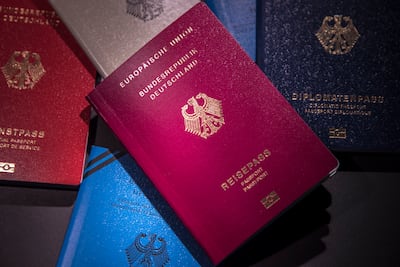A record number of Syrians have taken up German citizenship in the last year, new figures revealed on Tuesday.
More than 48,000 Syrians were naturalised as Germans last year – more than double the number from 2021, as refugees who arrived in 2015 become eligible for a passport.
Germany’s statistics office said Syrians made up more than a quarter of all those who took up citizenship in 2022.
Many were able to apply ahead of the eight-year waiting period by excelling in jobs, schools or language classes.
The figures also showed a notable increase in the number of Iraqis, Turks and Ukrainians taking up German passports.
“The high number of Syrians being naturalised is linked to the arrival of Syrian refugees between 2014 and 2016, who by now are increasingly meeting the requirements,” the statistics office said.
Hundreds of thousands of people arrived in Europe from Syria in 2015, with migrants receiving initial aid from charities and volunteers.
Despite heated political debate over their arrival, many have put down roots in the country, with the average age of Syrian migrants taking up German passports being 25.
Data released on Tuesday showed 32,300 men and 16,000 women were granted citizenship in the nation last year.
The usual requirements are eight years of residency in Germany, plus language and citizenship tests, allegiance to the German constitution and the ability to support themselves financially.
However, people with “special integration accomplishments”, such as showcasing good language skills or significant contributions to civil society, can shorten the waiting period to six years.
About 23,100 people met the special requirements last year – with Syrians making up 13,900 of such applicants.

Another 15,400 Syrians without an eight-year stay were naturalised as partners or children of eligible German citizens.
Separate figures released last month showed that about 1.2 million people in Germany have Syrian roots, meaning the number of new German citizens from Syria could further rise in the future.
The number of long-standing Ukrainian residents taking up German passports trebled to 5,600 in the first year of Russia's invasion, with the majority being women.
They were separate to the hundreds of thousands of Ukrainian refugees who arrived in Germany after the war broke out who were granted an initial one-year residency permit.
Those taking up German citizenship also included 14,200 people from Turkey, 6,800 from Iraq and 4,200 from Afghanistan.
The number of UK nationals opting to become Germans was 2,315, the lowest level since the 2016 Brexit referendum.
German Chancellor Olaf Scholz plans to loosen immigration requirements to address labour shortages and an ageing population.
This could involve relaxing Germany’s stance towards dual nationality as well as shortening the usual waiting period from eight years to five.
Experts have said that many Turks in Germany, who initially opted to keep their Turkish nationality, may choose to become dual citizens under the new rules.


